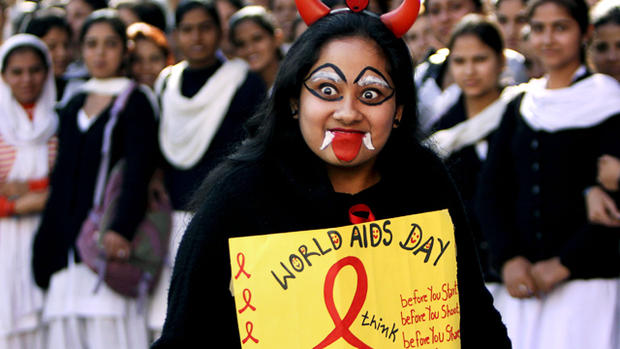HIV patients need AIDS drugs immediately, NYC recommends
(CBS/AP) People with HIV should receive AIDS drugs as soon as they are diagnosed. That's what New York health officials proposed Thursday, saying that the aggressive move has been shown to prolong life and to stem the spread of the disease.
PICTURES - World AIDS Day 2011: What's happening where
Patients have typically been put off the expensive pill regimen - which can cost up to $15,000 a year - until the immune system weakens. But Health Commissioner Thomas Farley said recent studies have shown the effectiveness of early treatment combined with education and testing.
"I'm more optimistic now than I've ever been about this epidemic that we can drive our new rates down to zero or close to it, eventually," Farley said in an interview Wednesday. "I don't know how soon. But I'm very optimistic of the direction that it's going to take."
More than 110,000 people in New York City are infected with HIV - more than in any other U.S. city and about 75 percent of all cases in the state. San Francisco, which had more than 18,000 people living with HIV in 2010, is believed to be the only other major city to also recommend immediate AIDS treatment for those diagnosed with HIV.
The new recommendation could initially help about 3,000 people get on medications, city health officials said. About 66,000 New Yorkers living with HIV are being effectively treated with AIDS drugs, they said, adding that it was difficult to estimate how many people would eventually need the medications.
What do doctors have to say?
"The New York City health department is a little bit ahead of the curve," said Dr. Michael Saag, AIDS researcher at the University of Alabama at Birmingham and past chairman of the HIV Medicine Association. "In my opinion, the rest of the country will follow and I think it will be pretty quick."
"It's an anachronism. It's old school. It's yesterday," he said, of the standard measure of the CD4 count as a way to determine the strength of the immune system. "I agree completely with the New York City health department."
Dr. Joel Gallant of Johns Hopkins University School of Medicine and vice chair of the HIV Medicine Association also recommends early treatment for his own patients. "Nobody I know who is an HIV expert feels that it's a bad idea to treat HIV at high CD4 counts from a medical or scientific standpoint," Gallant said. "If there are objections, they'd usually be based on cost or feasibility."
But cost questions are important, Saag said, because brand-name drugs can retail for $1,200 to $1,600 per month. "For sure, they're very expensive drugs and we should be careful about that," he said, though he added that the medications are going generic so costs should come down.
The cost for expanding the use of AIDS drugs would be covered by private insurance or by the AIDS Drug Assistance Program for the uninsured or underinsured, city health officials said. They said the benefits over the long term would far outweigh the initial costs because there would be fewer hospitalizations and new HIV cases.
HIV experts are split about whether early therapy should be recommended or optional. Besides the high costs, the pills have side effects from nausea to liver damage. Patients unwilling to take them religiously for life could develop drug resistance. But there's growing evidence that untreated HIV can lead to cancers and heart disease. Antiretroviral drugs are safer, have fewer side effects and work better than they did in the past.
A recent study showed that earlier treatment meant patients were 96 percent less likely to spread the virus to their uninfected partners.
In San Francisco, the time from diagnosis to having no virus in the blood went from 32 months in 2004 to eight months in 2008, for HIV patients who were treated early.
"That reflects that the newer medications are more potent and efficacious, and the doctors were likely initiating them earlier," Dr. Moupali Das, director of research at the San Francisco Department of Health HIV Prevention Section, said.
The CDC has more on HIV/AIDS.

